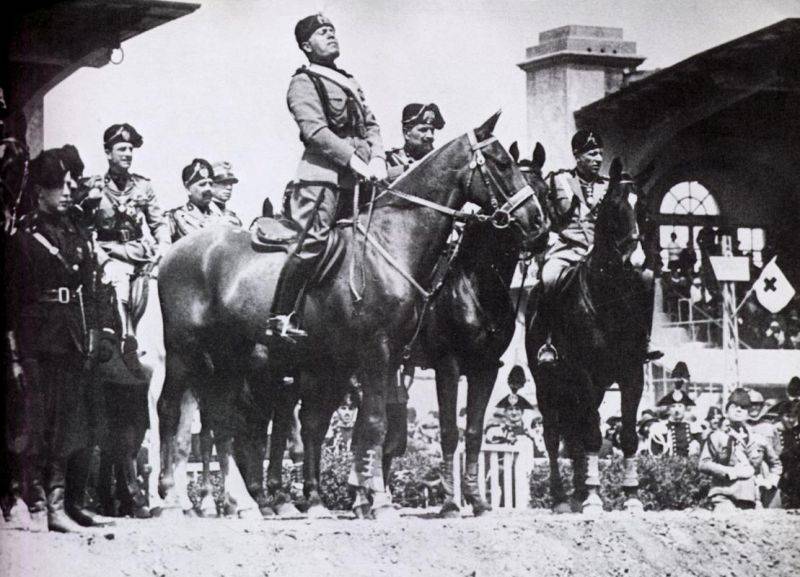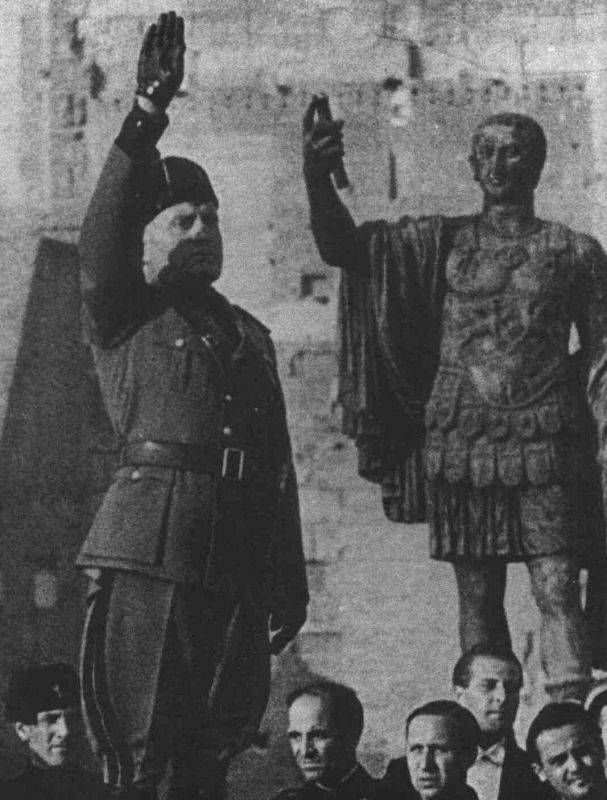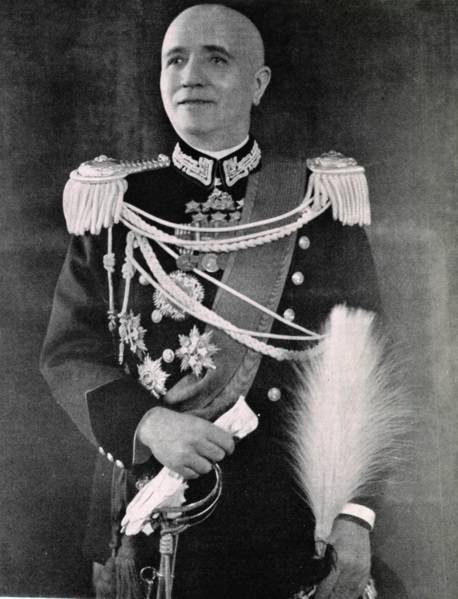How did the fascist rule in Italy end?

Benito Mussolini on horseback
Akela has missed
The Italian elite, the army and the people are tired of the unsuccessful war. They were fighting an enemy that they had never before experienced enmity. The Italian leader dragged an unprepared country into a war of attrition. The Italian army suffered defeat after defeat. Colonies in Africa were lost. The adventure in Greece almost failed, the Germans saved.
Power in the Balkans was unsteady, the Slavs and Greeks resisted. Russia lost its best army. Most of the trading fleet was drowned. English aviation systematically bombed the factories of the Italian heavy industry in the triangle of Genoa, Turin and Milan. The enemy carried out raids almost with impunity: the Italians could not organize strong air defense. The ports of southern Italy turned into ruins, the railway network was destroyed. The Germans did not help Italy avoid defeat in Africa and Sicily.
The disaster of the Italian army in North Africa (Defeat of the Axis Powers in North Africa) and the landing of the allied army in Sicily were the last straws and caused a political crisis in Italy. Dreams of a new Roman Empire vanished like smoke. Italy faced the threat of invasion and complete defeat in the war.
The army did not want to fight, the Italian soldiers preferred to scatter home and surrender. Anti-fascist and left-wing sentiments grew stronger in society. Communists, socialists and democrats demanded the resignation of the Duce, a separate peace with England and the United States, the restoration of democratic rights and freedoms. Therefore, the Italian elite decided that it was time to get rid of the Duce. Both the top of the fascist party, as well as the court and military circles, were ready to oppose him.
After the landing of the Anglo-American troops in Sicily (How the German 14th Panzer Corps held back the offensive of the two allied armies for 38 days) Duce immediately turned to the Fuhrer with a request for urgent help. But he did not receive it, all the reserves of the Reich were tied up on the Russian front.
In addition, Hitler did not believe that the Duce himself would be able to improve the situation in Italy. Anticipating that the Mussolini regime could soon collapse, the Fuhrer ordered the military to be ready for this. On May 21, 1943, the head of the Wehrmacht High Command (OKW), Field Marshal Wilhelm Keitel, prepared a rough plan for possible actions in Italy. This plan provided for several military operations at once, including the invasion of continental Italy and the capture of key facilities (Plan Alaric). Also, the Germans were ready to capture Rome and neutralize Italian troops in France and the Balkans.
The Germans are preparing divisions and forming several new formations to transfer them to Southern Europe, including Italy. In early July 1943, the headquarters of the future occupation group under Rommel was established near Munich. All this was done in the strictest confidence from the Italian allies.

Fascist Italy leader Benito Mussolini in front of a statue of the Roman Emperor
"July 25"
On July 16, 1943, Roosevelt and Churchill, in a joint message, urged the Italians, in the interests of preserving their dignity and well-being, to seize the moment and decide whether they would die for Mussolini and Hitler or live for the good of Italy and civilization. Whether they want to sacrifice Italy for the sake of Germany.
This appeal corresponded to the mood of both ordinary and noble and wealthy Italians. Against the backdrop of the collapse of the Italian army in Sicily, two groups of conspirators matured among the ruling fascist party, generals and monarchists, who were happy with everything while Mussolini was successfully building the Italian Empire.
So, the head of the military was the former head of the General Staff, Pietro Badoglio. He believed that he considered it necessary to remove not only the Duce, but also the king, as he had compromised himself with his connection with fascism. However, King Victor Emmanuel himself joined the conspirators and proposed Badoglio for the post of head of government. Also, the conspirators were closely associated with Italian big business, which received a lot from the Duce regime, and now wanted to maintain real power in the country.
On July 24, 1943, against the wishes of Mussolini, an emergency meeting of the Grand Fascist Council was held in Rome. The day before, the conspirators prepared a draft resolution. One of the leaders of the palace coup was the former Minister of Foreign Affairs, President of the lower house of the Italian Parliament (the Chamber of Fasces and Corporations) Dino Grandi. Opening the meeting, Benito Mussolini said that he had convened the Great Council not to discuss the situation in Italy, but to inform about the course of hostilities. The Duce blamed the defeat on the General Staff, which, according to him, was his main culprit, on the Italian soldiers, infected with the spirit of defeatism, and the inhabitants of Sicily, who greet the enemies as liberators.
Grandi, addressing Mussolini, said that he was the main responsibility for the defeat in the war. "Tear off your marshal's insignia," he declared, "and become again what you were: the head of the government of His Majesty the King." The atmosphere in the hall heated up. The chairman of the special fascist tribunal, Casanova, shouted about betrayal. The commander of the blackshirt corps, Galbiati, threatened to call his soldiers. Mussolini alone was indifferent to the coming storm. He listened to all the reproaches that rained down on him from all sides.
At about 3 o'clock in the morning, after an almost 10-hour meeting, the Duce put Grandi's resolution to the vote. By this resolution, the king became the head of the armed forces, and he also had the highest decision-making initiative. The result was known to the conspirators in advance: 19 votes for the removal of Mussolini against 7. The Duce was shocked, he did not expect that this was possible. Benito said: "You caused the crisis of the fascist regime." In fact, it was agony, not a crisis.
The next day, in an audience with King Victor Emmanuel III, Mussolini questioned the legality of the council's decision. But the king announced his resignation and the appointment of Marshal Badoglio as head of government. When leaving the royal villa of Savoia, Mussolini was arrested. Duce was sent to the island of Ponza, a few weeks later - to the islands of La Maddalena and finally to the ski resort on the plateau of Campo Imperatore in Gran Sasso.

Marshal Pietro Badoglio, leader of Italy after the fall of Benito Mussolini
Italy's exit from the war
The new government on the same day announced the fall of fascism. The Fascist Party offered no resistance. The population was informed that the king had assumed supreme command over the armed forces. The Blackshirts were disbanded and many became part of the armed forces.
The main goal of the new government was peace. Also, the Italians wanted to avoid turning the country into a battlefield, or to reduce hostilities to a minimum. Armed action against the German ally seemed impossible. 38 Italian divisions were out of the country in France, Corsica and the Balkans. On the peninsula there were only 18 of the weakest, poorly armed divisions, and a number of coastal defense formations, even worse trained and armed.
The morale of the army was at zero. The concentration of divisions, stationed in three groups in the Po Valley, in the region of Rome and in southern Italy, was a very difficult operation due to the destruction of the railway network and the loss of most of the transport in Africa. The Germans, without the permission of Rome, transferred several divisions to Northern Italy. The Italians understood that they themselves could neither defeat nor even stop the Germans.
Badoglio understood that Italy could not immediately go over to the side of England and the United States, it would be captured by the Germans. He announced that the war was going on. Italy is true to its word. Marshal introduced martial law and suppressed mass spontaneous protests of anti-fascists and communists who demanded an immediate truce, the complete elimination of fascism, the punishment of war criminals, the restoration of fundamental rights and freedoms, and the inclusion of representatives of anti-fascist parties in the government. The government had to make partial concessions: the fascist party was disbanded, the release of political criminals from prisons began, and trade unions were restored.
The Badoglio government held secret negotiations with the Anglo-Americans, offering to make peace. Negotiations were going on in Portugal and Sicily, they dragged on. The Italians were afraid to go to war with the Germans without serious support from the Anglo-American troops. They asked for help and guarantees. The Allies were preparing an invasion of Italy. Their demands were tough: to provide Corsica, Sardinia and the entire continental part of the country for the Allied bases, to transfer all warships and aircraft to them. Anglo-American forces were to gain access to all ports and airfields.
The bombing of Italian cities has intensified. Powerful blows were dealt to Turin, Milan, Genoa, Rome and other cities. On August 13, the Italians announced their readiness to surrender and asked to land 15 Anglo-American divisions in the Rome area.
Meanwhile, the German top military-political leadership understood which way the wind was blowing, and was preparing an intervention in Italy. In August, Army Group B was transferred to Northern Italy under the command of Rommel. The Fuhrer also instructed to find and release Mussolini.
September 3 Anglo-American troops began to cross the Strait of Messina and landed in southern Italy. On the same day in Sicily, representatives of the Italian authorities and the United Nations signed an armistice. On September 8, Italy officially ended the war with the Allies.
Information